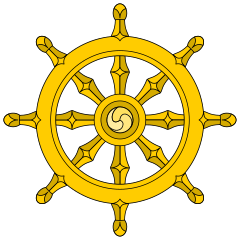Four Dharma Seals
Four Dharma Seals are the four characteristics which reflect some Buddhist teaching .[1][2] It is said that if a teaching contains the Four Dharma Seals then it can be considered Buddha Dharma.[3] although the Dharma Seals were all introduced after Gautama Buddha died.[4]
| Part of a series on |
| Buddhism |
|---|
 |
|
|
The Four Seals
The Four Seals can be variously translated as follows:
- All compounded things are impermanent
- All emotions are painful
- All phenomena are without inherent existence
- Nirvana is beyond description[1]
____________________________________________________________________
- All compounded things are impermanent.
- All contaminated things are suffering.
- All phenomena are empty and devoid of self.
- Nirvana is true peace.[5]
____________________________________________________________________
- Everything conditioned is impermanent.
- Everything influenced by delusion is suffering.
- All things are empty and selfless.
- Nirvana is peace.[6]
_____________________________________________________________________
As suffering is not an inherent aspect of existence[4] sometimes the second seal is omitted to make Three Dharma Seals.[7] However, when the second seal is taken to refer to existence contaminated by or influenced by the mental afflictions of ignorance, attachment, and anger and their conditioning actions (karma), this omission is not necessary.
See also
References
- Khyentse Rinpoche, Dzongsar (March 1, 2000). "Buddhism in a Nutshell: The Four Seals of Dharma". Lion's Roar. Retrieved April 3, 2013.
- "The Four Seals of the Dharma". About.com. Retrieved April 3, 2015.
- Okumura, Shōhaku (2010). Realizing Genjokoan: The Key to Dogen's Shobogenzo. Simon & Schuster. p. 25. ISBN 9780861716012.
- Nhất Hạnh, Thích (1998). The Heart of the Buddha's Teaching: Transforming Suffering Into Peace, Joy & Liberation : the Four Noble Truths, the Noble Eightfold Path, and Other Basic Buddhist Teachings. Broadway Books. p. 141. ISBN 9780767903691.
- Dalai Lama, Tenzin Gyatso (2012). Mind in Comfort and Ease. New York: Wisdom Publications. p. 119. ISBN 9780861717101.
- May, Will. "The Four Seals". www.bootl.org. BOOTL. Retrieved 20 July 2018.
- Yun, Hsing (2008). "The Core Teachings". Buddha's Light Publishing. p. 49. ISBN 9781932293326. Missing or empty
|url=(help)